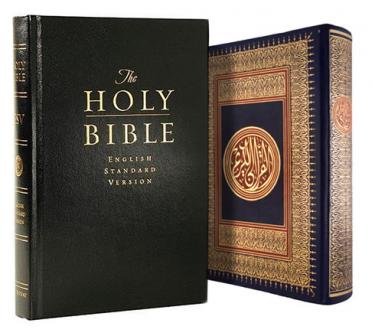The Koran vs. The Bible
The messages that became the Koran, or Quran, make up a volume about four-fifths the size of the New Testament.

Source: iStockphoto
Muslims reject the Bible—and by extension, Christianity and Judaism—as being corrupt and superseded by the Koran. "Muslims regard the Old and New Testaments as sharing two defects from which the Quran is free ... They record only portions of the Truth ... [and] the Jewish and Christian Bibles were partially corrupted in transmission, a fact that explains the occasional discrepancies that occur between their accounts and parallel ones in the Quran ... The Quran [is] the final and infallible revelation of God's will. Its second chapter says explicitly: 'This is the Scripture whereof there is no doubt'" (John Miller and Aaron Kenedi, Inside Islam, 2002, p. 22).
"Muhammad was at political odds with the Christians when he had acquired a certain amount of supplementary information concerning Christian beliefs ... The Christians were wrong in saying that Jesus ... was the son of Allah ... There was only one God, Allah ... He [Jesus] was not God ... Islam, the last prophetic revelation, which had been granted to the Arabs, was therefore the supreme and definitive religion" (Maxime Rodinson, Muhammad, 1980, p. 240).
There are many conflicts between the Bible and various passages in the Koran. Sura 19:34-35 refers to Jesus as merely the son of Mary and denies that He was the Son of God. Sura 4:157 denies that Jesus was killed in the crucifixion, saying that it was another who looked like Him.
Sura 61:6 states: "Jesus son of Mary, ... said to the Israelites: 'I am sent forth to you from [Allah] to confirm the Torah already revealed, and to give news of an apostle that will come after me whose name is Ahmad [the Praised One]'"—the latter being a reference to Muhammad, whose name meant "Praiseworthy." Jesus is here presented as declaring Himself as merely the forerunner of the greater and final prophet Muhammad.
The Bible, of course, presents Jesus as the Son of God, the ultimate Prophet and the way to salvation. As Paul wrote, "There is one God and one Mediator between God and men, the Man Christ Jesus, who gave Himself a ransom for all, to be testified in due time" (1 Timothy:2:5-6 [5] For there is one God, and one mediator between God and men, the man Christ Jesus;
[6] Who gave himself a ransom for all, to be testified in due time.).
Yet based on what the Koran states, "Muslims respect Jesus as one of perhaps 124,000 messengers or prophets Allah has sent, and one of the 25 listed in the Quran, but not as our Redeemer" (Marvin Olasky, "Islam vs. Liberty," World, Sept. 10, 2011).
Some branches of Islam teach that Jesus will return to earth—not as King of Kings and Lord of Lords, as the Bible teaches, but rather to accompany the mahdi, an Islamic messiah, and to convert the world, including Christians, to Islam by force.
Clearly, there is a stark contrast between the Holy Book of God and the revelation to Muhammad and teachings of Islam. And there cannot be two opposing revelations from the same God, as God cannot lie (Titus:1:2In hope of eternal life, which God, that cannot lie, promised before the world began;). Only one source is true—the Bible. For evidence of its trustworthiness, send for or download our free booklet Is the Bible True?
No comments:
Post a Comment